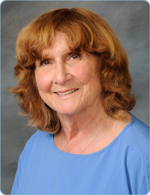#CMSC16 – An Interview with June Halper, the Consortium’s CEO and an MS Nurse Practitioner

When the 2016 annual meeting of the Consortium of Multiple Sclerosis Centers (CMSC) opens June 1, marking the organization’s 30th anniversary, at its head will be its executive director, June Halper. The honor is fitting. Halper, a nurse practitioner with a specialty in multiple sclerosis (MS) since 1978, has a long and distinguished record in promoting MS patient care, specialist training, and treatment advances.

June Halper
She served as the consortium’s president from 1995-97, and has been its CEO since 1992. She is also the founding director of the International Organization of MS Nurses (IOMSN) — which established a peer-nominated award in her honor recognizing nurses who excel in the treatment of MS patients and their families, and named her its first recipient — and she spearheaded the establishment of the Multiple Sclerosis International Credentialing Board that developed the first certification examination, given internationally twice a year since 2002, to nurses wanting to specialize in MS treatment and care.
In New Jersey, where Halper earned her specialty at Seton Hall University, she founded the MS Center at Holy Name Hospital in Teaneck, and served as its executive director until May 2008.
But her years in administration have hardly dimmed her sense of the human cost of a chronic disease like MS. In an email interview with Multiple Sclerosis News Today from Bionews Services Group, Halper highlighted among a list of “major” research advances the shifting focus to decisions that diminish life quality, like “lack of exercise, smoking” and insufficient vitamin D, a bit of which can be supplied by simply going outside and enjoying a sunny day.
A patient would do well, she also strongly advised, to “accept the diagnosis” and “adhere” to treatment, without making “MS your career.”
CMSC is based in Hackensack, N.J., and there Halper initiated its first certification examination for multi-disciplinary MS specialists in 2004 and, six years later, oversaw the group’s approval as a provider of advanced physician training by the Accreditation Council for Continuing Medical Education (ACCME).
The nonprofit consortium is, in her words, “the largest and only multi-disciplinary professional organization for multiple sclerosis in the world … focused on addressing issues related to MS care and research.” It’s enduring mission, she said, is to “enhance collaboration … increase resources and to transmit information, for the benefit of those affected” by the disease. And, as she added, to be each patient’s “A TEAM.”
Halper lists as the group’s core values: education, care and research; collaboration, locally, nationally and globally (an interview point she emphasized by italicizing); respect and care for MS patients; and equal service to all healthcare providers. Emphasis is also placed on advocacy of issues and concerns, and working closely with other advocates to advance their common interest.
Conference goals well mesh with these core points. Through research updates, poster presentations, and roundtable discussions by clinicians, researchers and industry leaders, CMSC 2016 — which takes place June 1–4 in National Harbor, Maryland — aims to provide its thousands of attendees with the knowledge they need to continue to further both MS clinical practice and scientific discoveries.
discussions by clinicians, researchers and industry leaders, CMSC 2016 — which takes place June 1–4 in National Harbor, Maryland — aims to provide its thousands of attendees with the knowledge they need to continue to further both MS clinical practice and scientific discoveries.
As Halper said, “research has taught us that there is always a lot more to study and learn.”
Below are some highlights from Multiple Sclerosis News‘ interview with June Halper, in a Q&A format.
Q: As a certified nurse specialized in multiple sclerosis since 1978, what in your opinion are the major advances in MS research, management, and patient care since the late 70s? What particularly stands out to you?
Halper: The major advances in MS research are the increased understanding of the neuropathology of the disease; identification of risk-producing behaviors such as smoking, lack of exercise, vitamin D, and possibly genetics; and, of course, the important role of disease modification to alter the natural history of the disease.
Research has also taught us that there is a lot more to study and learn. For example, why is progressive MS so different for relapsing forms? What can MRI teach us besides supporting the diagnosis? What other biologic markers are there to predict the disease course and guide treatment selection?
Q: In your perspective, what are the biggest challenges currently facing MS patients?
Halper: The biggest challenges faced by the MS patient are to:
- Accept the diagnosis and make it a part of a new normalcy
- Integrate chronic illness into one’s life plan
- Adhere to prescribed treatments, both pharmacologic and non-pharmacologic
- Stay healthy and well, remain active, don’t make MS your career
Q: Is there a topic – a discussion/poster/roundtable – in the upcoming conference that’s particularly relevant for you?
Halper: Each opening lecture is very important to me. Topics such as relapses (Lublin); research (Jalbut, Wolinsky, and Antel) are not to be missed. The Fundamentals of MS Course is designed to meet the needs of new and emerging clinicians. Each track (nursing, science, rehab, mental health, neurology) all have meaning for me.
Q: How has the focus of the CMSC conference changed over the years?
Halper: It really has not. It has and always will focus on comprehensive care and the team approach to MS.
We provide a broad-based curriculum for all professionals with seasoned faculty as well as novices; North American as well as European presenters; and roundtables and social events to establish and grow networks.
It has just gotten bigger, better, more exciting, and harder on your feet.
Q: Would you like to leave a message for the attendees of the upcoming 2016 CMSC Meeting?
Halper: Come, learn, network, invigorate yourself through the work of others so you may return to your professional roles refreshed with new ideas and lots of plans.
Q: And would you like to leave one for MS patients themselves?
Halper: We are here for you to make your lives dealing with MS easier and better. We are your A TEAM.
Multiple Sclerosis News Today will offer its readers on-site coverage of the 2016 CMSC Annual Meeting, anchored by Bionews Services Group managing editor Ana de Barros, PhD, and Patrícia Silva, PhD, managing editor of Multiple Sclerosis News Today. Also attending will be Chris Comish, president and CEO of Bionews Services, Carol Jertson, contributing editor, and the Bionews Services’ social media director Isaura Santos and social media manager Andreia Peixoto.
The Bionews team’s on-site reporting will include feature articles, interviews, and social media coverage on Facebook, Twitter, and Pinterest. Social media accounts for Multiple Sclerosis News Today can be found in the upper righthand corner of its homepage.






